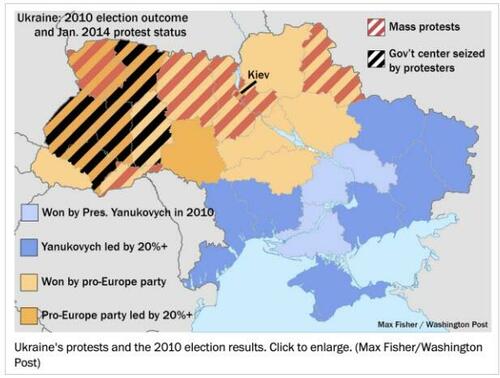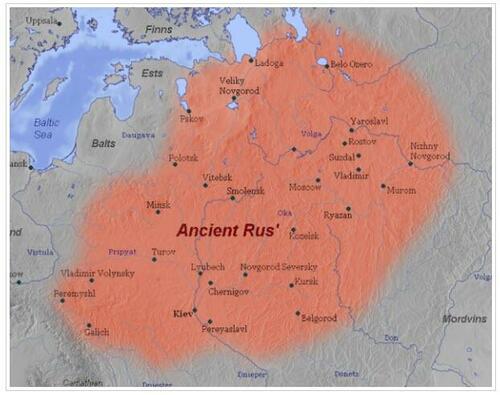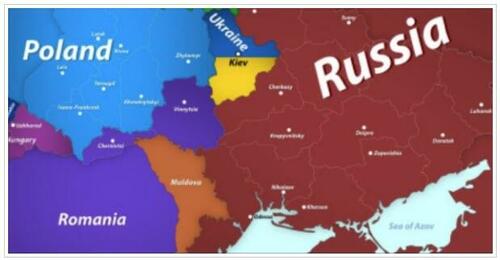
Authorerd by Yves Smith via NakedCapitalism.com,
Putin and Medvedev recently made statements that took an expansive view of what “Russian lands” in Ukraine amounted to. At least as far as Putin is concerned, what he said at the November 3 meeting with members of the Civic Chamber is, philosophically, not all that different than the sort of historical observations Putin had made before.
Nevertheless, both Ukrainian Pravada and Alexander Mercouris regarded the Putin remarks as potentially significant, and Medvedev reiterating them would seem to confirm that take. And both suggested that Kiev might wind up as part of Russia.
From Medvedev, who loves trolling Western officials:
❗️At least Russians have intellect unlike our Western puppet morons
— jamiemcintyre (@jamiemcintyre21) November 13, 2023
Former Russian PM Dmitry Medvedev: "NATO must admit that Odessa, Nikolaev, Kiev, and practically everything else is not Ukraine at all"
✍️ He posted on his Telegram: "Europe is boiling.
Hundreds of thousands…
Now admittedly, Ukraine has plenty of reason to be jumpy, Putin was arguably just ringing the changes on favored themes before a relevant audience, and Medvedev was putting on his usual tough cop hat. Or perhaps both Russian leaders are trying to get Ukraine and the West to understand that Russia will control the end-game and reset their views as to what that could amount to.
Regardless of whether these remarks represent a meaningful shift, they serve as a reminder that Russia is on track to take a maximalist stance in terms of territorial acquisition. For instance, even Russia-friendly commentators wondered if Russia would take Odessa. Most now seem to see that as a given and are adding more sections of Ukraine as potential acquisitions. But as we flagged from the very outset, Russia could lose the peace by not coming up with a good solution as to what to do about Western Ukraine.
So does the renewed talk about Ukraine being an artificial construct carved out of Russia, and of Ancient Rus? Or is this just posturing, to make those paying attention less unhappy about the endgame, to act as if Russia has serious designs on parts of Western Ukraine so that when Russia integrates less into Russia, that the West can claim a face saving success?
Ukraine’s Appallingly Poor Prospects
Things are so bad it is hard to know where to begin.
Big Serge recently posted a fine, detailed account of why it was vanishingly unlikely that Ukraine would achieve its aims of pushing Russia back to Ukraine’s 1991 borders. Admittedly, hindsight is 20/20. At the start of the war, many thought, including many in Russia, that the shock and awe sanctions would cripple Russia, ideally lead to Putin’s ouster or at least severely destabilize Russian leadership, and undermine industrial, particularly military, output. The West also believed what is now clear was its own nonsense, that Russia had a poorly armed and led military, when it was was the US and NATO that had optimized their forces to fight insurgents, and had gotten very good at building super expensive, fussy weapons systems that didn’t necessarily perform all that well when tested. Even worse, it still has not been adequately acknowledged that Russia is ahead in many critical categories, such as air defense, hypersonic missiles, and signal jamming.
What is striking about the current state of play is not simply that Ukraine is losing the war with Russia, and it’s just a matter of time before Russia dictates terms, but that the Ukraine government is acting in ways that benefits the Russian military, to the destruction of what is left of its society and economy.
Militarily, Ukraine is approaching a catastrophic condition. That does not mean a collapse is imminent; key variables include whether the Ukraine military leadership revolts against Zelensky and how hard Russia pushes into growing Ukraine weakness. Russia may prefer to go slowly (mind you, it is making a concerted effort to crack the well fortified Avdiivka1), not just to reduce losses of its troops, but also to more throughly bleed out Ukraine and give the West time to adjust psychologically to Ukraine’s prostration.
Another factor that bears repeating is that Russia knows well this is a war against NATO. That will make the eventual defeat more consequential, even if the US and its minions come up with a face-saving pretense, like Putin was going march all the way to Paris (or Poland) and they succeeded in stopping that. That is one aspect that Big Serge gives short shrift: that this was a messy coalition war, which meant that for Ukraine to message success often trumped realistic assessments (how often was Russia just about to run out of missiles? Or having to raid washing machines for chips?). So not only were Ukraine’s backers not making enough weaponry to keep up with Russia’s output (which Russia then kept increasing), it was not the right equipment. Ukraine first stripped NATO cupboards bare of old Soviet style gear, which their troops were trained to handle. They then got a hodge podge of Western materiel, which they were often not well trained enough to handle proficiently, plus the mix of weaponry created a logistical nightmare. Scott Ritter argued that so many different types of equipment put Ukraine in a worse position.
And that’s before getting to poorly (barely) trained forces. Depending on how you are counting, Ukraine is on its third or fourth army. A recent story in Time Magazine serves as one-stop shopping for the deteriorating state of its forces and its difficulty in replenishing losses. The average age at the start of the war (30 to 35, due in part to a demographic dearth of men in their 20s) is now up to 43. And:
Now recruitment is way down. As conscription efforts have intensified around the country, stories are spreading on social media of draft officers pulling men off trains and buses and sending them to the front. Those with means sometimes bribe their way out of service, often by paying for a medical exemption. Such episodes of corruption within the recruitment system became so widespread by the end of the summer that on Aug. 11 Zelensky fired the heads of the draft offices in every region of the country.
The decision was intended to signal his commitment to fighting graft. But the move backfired, according to the senior military officer, as recruitment nearly ground to a halt without leadership. The fired officials also proved difficult to replace, in part because the reputation of the draft offices had been tainted. “Who wants that job?” the officer asks. “It’s like putting a sign on your back that says: corrupt.”
A new CNN article also discusses Ukraine’s manpower problems, but weirdly tries to spin Ukraine as having headroom by not having yet gone to full conscription. But it does point out that Ukraine has imposed martial law and restricts travel
Ukraine’s military was about 15% female as of 2020, and recent rule changes allowed for conscription of women with medical and pharmacy training, so recent claims that Ukraine is conscripting women look largely to be misrepresentations of existing policy. However, it may still be that Ukraine is using more women in combat roles of late: Dima of Military Summary reported this week of seeing a video of a trench with dead women soldiers in it.
Experts have argued that even with diminishing levels of equipment and shells, that absent a revolt or surrender by the military, Ukraine could keep up a fight for a while. The West, after all, is probably capable of sending in materiel at some level. But the manpower, particularly trained manpower, problem is only going to get worse. And it’s now acknowledged in the Western press as pretty bad.
There’s been much less discussion of the Ukraine economy, which is set to go off a more dramatic cliff than its combat capability. Western journalists go almost entirely to Kiev, and then likely only near government buildings and foreign-official venues (tony restaurants) and so have little feel for day to day life. The reporters who do venture further afield are going mainly to combat areas. We need to do a bit more digging and give a fuller report, but it doesn’t take a lot of effort to work out that the near and long-term prospects for Ukraine are terrible, and it was staring out as the poorest and most corrupt country in Europe.
Ukraine is facing a demographic disaster, as Moon of Alabama and others have chronicled. It already had a dearth of young adults due to a birth collapse (similar to what Russia suffered) in the 1990s. It’s no secret that many Ukrainians have fled for Europe and the majority are not expected to come back. Moreover, that population is also likely to skew young. Douglas Macgregor had said that his sources estimate that Ukraine is down from a pre-war population of 43 million to 19 million in the territories the government in Kiev controls. And the scuttlebutt is Zelensky, to keep the fight up, is looking to or has actually started throwing more young people into the meat grinder, by tightening up on essential employment and college exemptions.
And keep in mind that Ukraine is also suffering a high level of debilitation among war survivors. The Wall Street Journal reported months ago that orders for prosthetics might be as high as 50,000. That was before the famed counteroffensive got going.
As we pointed out and the Western press has also been acknowledging, Ukraine has not done a very good job of repairing its grid after the Russian attacks last fall and winter, to the degree it may fall over in certain areas under higher winter loads. Some sources have suggested the repair funds were partly looted. That may be true. But we’ve also pointed out that Ukraine is using Soviet gear and has been exhausting stocks of spared among former Warsaw Pact members. No one is going to set up new factories to do a very large but limited run of various components for Ukraine’s rebuilding. That means that any of the areas that have suffered critical damage that can no longer get replacements from the West will find Russia controls their reconstruction.
Ukraine tax receipts have collapsed as defense spending has spiked. Ukraine projected a budget deficit of $38 billion in March. Given optimistic assumptions about its super duper counteroffensive, one has to think that forecast was similarly optimistic. Set that against two stopgap spending bills with no Ukraine funding and Europe saying loudly that it can’t fill the US money gap. I have no idea what the lag is between allocation approvals and cash actually arriving in Ukraine official coffers, but one would have to think the US till is about to be emptied. And Ukraine will crash from its already fallen level of functioning. In Russia even during its mass privatizations, loss of services and economic/demographic decline, some critical public servants kept working for no or little compensation. Putin made a point of giving teachers their back pay in his early years as President. How much social cohesion is there in Ukraine, particularly after so many have already abandoned it?
Also keep in mind Ukraine had a nominal GDP in 2022 of $160 billion on a nominal basis, nearly $380 billion on a PPP basis. Those figures are likely exaggerated by including the parts of Ukraine that voted to join Russia. So even looking at these results in the most generous way possible, Ukraine is running a deficit of 10% of GDP, when it already has inflation of 30%.
Big deficits after a sudden reduction of productive capacity is a textbook prescription for hyperinflation.
We’ve also pointed out the Western reconstruction talk was a bunch of hooey, since private sector types do infrastructure deals only as exercises in looting (we’ve posted on how new-build deals go bankrupt). So at best, this initiative was set to be an exercise in strip mining what was left of Ukraine. That’s now been indirectly confirmed by the reconstruction czar Penny Pritzker herself. From Ukrainska Pravda via Yahoo in Imagine there may be no help: conclusions of US Special Representative’s visit to Ukraine:
Penny Pritzker, US Special Representative for Ukraine’s Recovery, has suggested that officials imagine how the country could survive economically without US aid during her first visit to Ukraine….
Ukrainska Pravda stated that her first visit to Ukraine had left “a rather disturbing aftertaste in many government offices” here.
One of the sources, familiar with the course of Pritzker’s meetings, said that she tried to “lead [them] to the idea” of how Ukraine could survive economically without American aid.
Quote from the source: “At the meetings, Penny tried to get people to think, like, let’s imagine that there is no American aid: what do you need to do over the next year to make sure that your economy can survive even in this situation? And it really stressed everyone out.”
More details: Andrii Hunder, the president of the American Chamber of Commerce in Ukraine, told Ukrainska Pravda that Pritzker’s main question during her visit and meetings with businesses was “What hinders success and who hinders it?”
The UP article reads that perhaps the strongest concern among most people who interacted with Biden’s representative was her call not to wait for Western assistance, but to seek areas of growth as if it wouldn’t be coming.
Does the Russian Map Talk Represent New Thinking About the End Game?
John Mearsheimer has argued that Russia wants a dysfunctional rump Ukraine. The same way the US, NATO and Ukraine obliged Russia’s war of attrition game plan by continuing to throw ever weaker forces against Russian lines, so to have they managed to do even more damage to Ukraine’s economy that the war already would have done by pumping up the military and government with support it could not maintain for the long haul, and then withdrawing it abruptly.
However, even though Russia looks like it will eventually impose its will on Ukraine, Russia still faces constraints. The more of Ukraine Russia decides to incorporate, the more it will have to rebuild. Those efforts would compete with another Putin initiative, announced early in the SMO, of greatly improving public amenities in remote areas (I envision manufacturing and mining towns in the hinterlands). Russia is also already facing labor shortages. To some degree, it might be able to redeploy men now working in manufacturing, particularly arms related, to reconstruction. But Russia may face labor constraints on how quickly it can restore infrastructure and buildings.
Putin and his inner circle likely also recognize the risk and cost of tying to hold areas where Russia is not welcome. Putin even said words to that effect early on. Putin also seems to value referendums as validating integrating territory into Russia. These would argue, all things being equal, for limiting the parts of Ukraine that are candidates for integration to ones with a solidly ethnic Russian majority.
To look at an overlapping set of consideration, ever since the Munich Security Conference, Putin has been trying to get a hostile Europe and US to acknowledge and respect Russia’s security needs. So what territorial end state is optimal, or alternatively, the least bad compromise, particularly given that ex Hungary and Belarus, Russia would continue to have hostile neighbors to its west?
This is why both Putin and Medvedev suggesting Kiev might be part of the equation would seem to be a significant shift. There are lots of maps of electoral results that Western pundits have used as proxies for ethnic Russian versus ethnic Ukrainian representation. This one from the Washington Pos is indicative. You can see Kiev is most assuredly in a European-leaning part of the country, as if that were in doubt:
But in Putin’s November 3 speech, he described long form as to how Russia has claims on “Ancient Rus” and that would seem to include Kiev2:
Contrast this with Medvedev’s not-exactly-a-joke earlier proposal:
Admittedly, Putin has said repeatedly, such as in his 2021 article, On the Historical Unity of Russians and Ukrainians, that Russians and Ukrainians are one people and the recent divisions were engineered to facilitate control. But it’s going to be hard to put the discord genie back in the bottle.
One guess is that Russia has decided it eventually has to take, or ideally, find some other way to subdue Kiev as the administrative center of Ukraine. But what does it do then? Even if Russia is able to create a puppet state, how does it exercise enough control without it becoming a governance and financial albatross? Remember, Kiev is a physically sprawling city of 3 million, straddling the Dnieper. It would be hard to secure it against the will of its inhabitants….unless, say, even more could be encouraged to decamp.
But it seems any other way, with rump Ukraine entering into some sort of victor’s peace with Russia, is ripe for the West trying to undo that. Perhaps (as we and John Helmer have suggested) Russia creates a particularly impoverished and very low population buffer zone (one way is by de-electrifying it) as a DMZ of sorts.
Again, at a minimum Russia’s leadership recognizes it has ever more degrees of freedom in terms of what Ukraine’s end state might be. And I may not be imaginative enough. But I don’t see how things have gotten much better regarding the potentially festering problem of western Ukraine. Perhaps there have been better remedies bandied about by Russian pundits and pols that have not gotten coverage here. Any reader intel or informed speculation very much welcomed.
* * *
1 Even so, some regular military commentators take note of the fact that Russia has a potential cauldron here but does not seem to be working hard to close it. They speculate that Russia is leaving it open to allow Ukraine to feed yet more men and material into this fire, just as they did in Bakhmut. As Big Serge points out:
We need to think about that initial Russian assault in the context of the Avdiivka battlespace. Avdiivka is rather unique in that the entire city and the railway running towards it sit upon an elevated ridge. With the city now enveloped on three sides, remaining Ukrainian logistical lines run along the floor of a wetland basin to the west of the city – the only corridor that remains open. Russia now has a position on the dominating heights that directly overlook the basin, and are in the process of expanding their position along the ridge. In fact, contrary to the claim that the Russian assault collapsed with heavy casualties, the Russians continue to expand their zone of control to the west of the railway, have already breached the outskirts of Stepove, and are pushing into the fortified trench network in southeastern Avdiivka proper.
Now, at this point it’s probably rational to want to compare the situation to Bakhmut, but the AFU forces in Avdiivka are actually in a much more dangerous position. Much was made of so-called “fire control” during the battle for Bakhmut, with some insinuating that Russia could isolate the city simply by firing artillery at the supply arteries. Needless to say, this didn’t quite pan out. Ukraine lost plenty of vehicles on the road in and out of Bakhmut, but the corridor remained open – if dangerous – until the very end. In Avdiivka, however, Russia will have direct ATGM line of sight (rather than spotty artillery overwatch) over the supply corridor on the floor of the basin. This is a much more dangerous situation for the AFU, both because Avdiivka has the unusual feature of a single dominating ridge on the spine of the battlespace, and because the dimensions are smaller – the entire Ukrainian supply corridor here runs along a handful of roads in a 4 kilometer gap.
2 From Putin’s remarks at the November 3 meeting:
First of all, we all know very well – these are the facts of history – that all, as you said, the South Russian lands were given to the Soviet Ukraine during the formation of the Soviet Union.
There was no Ukraine as part of the empire, there were regions, and it came in the 16th century, Ukraine, consisted of three regions: Kiev and the Kiev region, Zhitomir, Chernigov – that’s all. It came from the Polish-Lithuanian Commonwealth, from Poland voluntarily. We have a letter in our archives – I have already mentioned it – we, the Russian Orthodox people, appeal to Moscow, to the Tsar, and so on. In an attempt to defend our rights, we addressed the same letter to Warsaw: we, the Russian Orthodox people, ask to preserve this and that, demand, and so on.
Then what happened happened. They started to form the Soviet Union and created a huge Ukraine, and primarily and to a large extent at the expense of the South Russian lands – all the Black Sea region and so on, although all these cities, as we know, were founded by Catherine the Great after a series of wars with the Ottoman Empire.
Ok, so it happened, modern Russia came to terms with it after the collapse of the Soviet Union. But when they started to exterminate everything Russian there – that is, of course, extreme. And in the end they declared that Russians are not an indigenous nation in these lands – it is a complete outrage, you know? And at the same time, they also started exterminating Russians in Donbas to the applause of the West.
As it turned out that, although they signed the so-called Minsk agreements for a peaceful settlement with us, they were not going to honour them, as it turned out later, and moreover, they publicly refused to honour them at all. And they also started dragging this entire territory into NATO – brazenly, without heeding any of our protests, without paying attention to our position, as if we did not exist at all. This is what lies at the centre of the conflict that is taking place today. This is the cause of this conflict.
Authorerd by Yves Smith via NakedCapitalism.com,
Putin and Medvedev recently made statements that took an expansive view of what “Russian lands” in Ukraine amounted to. At least as far as Putin is concerned, what he said at the November 3 meeting with members of the Civic Chamber is, philosophically, not all that different than the sort of historical observations Putin had made before.
Nevertheless, both Ukrainian Pravada and Alexander Mercouris regarded the Putin remarks as potentially significant, and Medvedev reiterating them would seem to confirm that take. And both suggested that Kiev might wind up as part of Russia.
From Medvedev, who loves trolling Western officials:
❗️At least Russians have intellect unlike our Western puppet morons
Former Russian PM Dmitry Medvedev: “NATO must admit that Odessa, Nikolaev, Kiev, and practically everything else is not Ukraine at all”
✍️ He posted on his Telegram: “Europe is boiling.
Hundreds of thousands…
— jamiemcintyre (@jamiemcintyre21) November 13, 2023
Now admittedly, Ukraine has plenty of reason to be jumpy, Putin was arguably just ringing the changes on favored themes before a relevant audience, and Medvedev was putting on his usual tough cop hat. Or perhaps both Russian leaders are trying to get Ukraine and the West to understand that Russia will control the end-game and reset their views as to what that could amount to.
Regardless of whether these remarks represent a meaningful shift, they serve as a reminder that Russia is on track to take a maximalist stance in terms of territorial acquisition. For instance, even Russia-friendly commentators wondered if Russia would take Odessa. Most now seem to see that as a given and are adding more sections of Ukraine as potential acquisitions. But as we flagged from the very outset, Russia could lose the peace by not coming up with a good solution as to what to do about Western Ukraine.
So does the renewed talk about Ukraine being an artificial construct carved out of Russia, and of Ancient Rus? Or is this just posturing, to make those paying attention less unhappy about the endgame, to act as if Russia has serious designs on parts of Western Ukraine so that when Russia integrates less into Russia, that the West can claim a face saving success?
Ukraine’s Appallingly Poor Prospects
Things are so bad it is hard to know where to begin.
Big Serge recently posted a fine, detailed account of why it was vanishingly unlikely that Ukraine would achieve its aims of pushing Russia back to Ukraine’s 1991 borders. Admittedly, hindsight is 20/20. At the start of the war, many thought, including many in Russia, that the shock and awe sanctions would cripple Russia, ideally lead to Putin’s ouster or at least severely destabilize Russian leadership, and undermine industrial, particularly military, output. The West also believed what is now clear was its own nonsense, that Russia had a poorly armed and led military, when it was was the US and NATO that had optimized their forces to fight insurgents, and had gotten very good at building super expensive, fussy weapons systems that didn’t necessarily perform all that well when tested. Even worse, it still has not been adequately acknowledged that Russia is ahead in many critical categories, such as air defense, hypersonic missiles, and signal jamming.
What is striking about the current state of play is not simply that Ukraine is losing the war with Russia, and it’s just a matter of time before Russia dictates terms, but that the Ukraine government is acting in ways that benefits the Russian military, to the destruction of what is left of its society and economy.
Militarily, Ukraine is approaching a catastrophic condition. That does not mean a collapse is imminent; key variables include whether the Ukraine military leadership revolts against Zelensky and how hard Russia pushes into growing Ukraine weakness. Russia may prefer to go slowly (mind you, it is making a concerted effort to crack the well fortified Avdiivka1), not just to reduce losses of its troops, but also to more throughly bleed out Ukraine and give the West time to adjust psychologically to Ukraine’s prostration.
Another factor that bears repeating is that Russia knows well this is a war against NATO. That will make the eventual defeat more consequential, even if the US and its minions come up with a face-saving pretense, like Putin was going march all the way to Paris (or Poland) and they succeeded in stopping that. That is one aspect that Big Serge gives short shrift: that this was a messy coalition war, which meant that for Ukraine to message success often trumped realistic assessments (how often was Russia just about to run out of missiles? Or having to raid washing machines for chips?). So not only were Ukraine’s backers not making enough weaponry to keep up with Russia’s output (which Russia then kept increasing), it was not the right equipment. Ukraine first stripped NATO cupboards bare of old Soviet style gear, which their troops were trained to handle. They then got a hodge podge of Western materiel, which they were often not well trained enough to handle proficiently, plus the mix of weaponry created a logistical nightmare. Scott Ritter argued that so many different types of equipment put Ukraine in a worse position.
And that’s before getting to poorly (barely) trained forces. Depending on how you are counting, Ukraine is on its third or fourth army. A recent story in Time Magazine serves as one-stop shopping for the deteriorating state of its forces and its difficulty in replenishing losses. The average age at the start of the war (30 to 35, due in part to a demographic dearth of men in their 20s) is now up to 43. And:
Now recruitment is way down. As conscription efforts have intensified around the country, stories are spreading on social media of draft officers pulling men off trains and buses and sending them to the front. Those with means sometimes bribe their way out of service, often by paying for a medical exemption. Such episodes of corruption within the recruitment system became so widespread by the end of the summer that on Aug. 11 Zelensky fired the heads of the draft offices in every region of the country.
The decision was intended to signal his commitment to fighting graft. But the move backfired, according to the senior military officer, as recruitment nearly ground to a halt without leadership. The fired officials also proved difficult to replace, in part because the reputation of the draft offices had been tainted. “Who wants that job?” the officer asks. “It’s like putting a sign on your back that says: corrupt.”
A new CNN article also discusses Ukraine’s manpower problems, but weirdly tries to spin Ukraine as having headroom by not having yet gone to full conscription. But it does point out that Ukraine has imposed martial law and restricts travel
Ukraine’s military was about 15% female as of 2020, and recent rule changes allowed for conscription of women with medical and pharmacy training, so recent claims that Ukraine is conscripting women look largely to be misrepresentations of existing policy. However, it may still be that Ukraine is using more women in combat roles of late: Dima of Military Summary reported this week of seeing a video of a trench with dead women soldiers in it.
Experts have argued that even with diminishing levels of equipment and shells, that absent a revolt or surrender by the military, Ukraine could keep up a fight for a while. The West, after all, is probably capable of sending in materiel at some level. But the manpower, particularly trained manpower, problem is only going to get worse. And it’s now acknowledged in the Western press as pretty bad.
There’s been much less discussion of the Ukraine economy, which is set to go off a more dramatic cliff than its combat capability. Western journalists go almost entirely to Kiev, and then likely only near government buildings and foreign-official venues (tony restaurants) and so have little feel for day to day life. The reporters who do venture further afield are going mainly to combat areas. We need to do a bit more digging and give a fuller report, but it doesn’t take a lot of effort to work out that the near and long-term prospects for Ukraine are terrible, and it was staring out as the poorest and most corrupt country in Europe.
Ukraine is facing a demographic disaster, as Moon of Alabama and others have chronicled. It already had a dearth of young adults due to a birth collapse (similar to what Russia suffered) in the 1990s. It’s no secret that many Ukrainians have fled for Europe and the majority are not expected to come back. Moreover, that population is also likely to skew young. Douglas Macgregor had said that his sources estimate that Ukraine is down from a pre-war population of 43 million to 19 million in the territories the government in Kiev controls. And the scuttlebutt is Zelensky, to keep the fight up, is looking to or has actually started throwing more young people into the meat grinder, by tightening up on essential employment and college exemptions.
And keep in mind that Ukraine is also suffering a high level of debilitation among war survivors. The Wall Street Journal reported months ago that orders for prosthetics might be as high as 50,000. That was before the famed counteroffensive got going.
As we pointed out and the Western press has also been acknowledging, Ukraine has not done a very good job of repairing its grid after the Russian attacks last fall and winter, to the degree it may fall over in certain areas under higher winter loads. Some sources have suggested the repair funds were partly looted. That may be true. But we’ve also pointed out that Ukraine is using Soviet gear and has been exhausting stocks of spared among former Warsaw Pact members. No one is going to set up new factories to do a very large but limited run of various components for Ukraine’s rebuilding. That means that any of the areas that have suffered critical damage that can no longer get replacements from the West will find Russia controls their reconstruction.
Ukraine tax receipts have collapsed as defense spending has spiked. Ukraine projected a budget deficit of $38 billion in March. Given optimistic assumptions about its super duper counteroffensive, one has to think that forecast was similarly optimistic. Set that against two stopgap spending bills with no Ukraine funding and Europe saying loudly that it can’t fill the US money gap. I have no idea what the lag is between allocation approvals and cash actually arriving in Ukraine official coffers, but one would have to think the US till is about to be emptied. And Ukraine will crash from its already fallen level of functioning. In Russia even during its mass privatizations, loss of services and economic/demographic decline, some critical public servants kept working for no or little compensation. Putin made a point of giving teachers their back pay in his early years as President. How much social cohesion is there in Ukraine, particularly after so many have already abandoned it?
Also keep in mind Ukraine had a nominal GDP in 2022 of $160 billion on a nominal basis, nearly $380 billion on a PPP basis. Those figures are likely exaggerated by including the parts of Ukraine that voted to join Russia. So even looking at these results in the most generous way possible, Ukraine is running a deficit of 10% of GDP, when it already has inflation of 30%.
Big deficits after a sudden reduction of productive capacity is a textbook prescription for hyperinflation.
We’ve also pointed out the Western reconstruction talk was a bunch of hooey, since private sector types do infrastructure deals only as exercises in looting (we’ve posted on how new-build deals go bankrupt). So at best, this initiative was set to be an exercise in strip mining what was left of Ukraine. That’s now been indirectly confirmed by the reconstruction czar Penny Pritzker herself. From Ukrainska Pravda via Yahoo in Imagine there may be no help: conclusions of US Special Representative’s visit to Ukraine:
Penny Pritzker, US Special Representative for Ukraine’s Recovery, has suggested that officials imagine how the country could survive economically without US aid during her first visit to Ukraine….
Ukrainska Pravda stated that her first visit to Ukraine had left “a rather disturbing aftertaste in many government offices” here.
One of the sources, familiar with the course of Pritzker’s meetings, said that she tried to “lead [them] to the idea” of how Ukraine could survive economically without American aid.
Quote from the source: “At the meetings, Penny tried to get people to think, like, let’s imagine that there is no American aid: what do you need to do over the next year to make sure that your economy can survive even in this situation? And it really stressed everyone out.”
More details: Andrii Hunder, the president of the American Chamber of Commerce in Ukraine, told Ukrainska Pravda that Pritzker’s main question during her visit and meetings with businesses was “What hinders success and who hinders it?”
The UP article reads that perhaps the strongest concern among most people who interacted with Biden’s representative was her call not to wait for Western assistance, but to seek areas of growth as if it wouldn’t be coming.
Does the Russian Map Talk Represent New Thinking About the End Game?
John Mearsheimer has argued that Russia wants a dysfunctional rump Ukraine. The same way the US, NATO and Ukraine obliged Russia’s war of attrition game plan by continuing to throw ever weaker forces against Russian lines, so to have they managed to do even more damage to Ukraine’s economy that the war already would have done by pumping up the military and government with support it could not maintain for the long haul, and then withdrawing it abruptly.
However, even though Russia looks like it will eventually impose its will on Ukraine, Russia still faces constraints. The more of Ukraine Russia decides to incorporate, the more it will have to rebuild. Those efforts would compete with another Putin initiative, announced early in the SMO, of greatly improving public amenities in remote areas (I envision manufacturing and mining towns in the hinterlands). Russia is also already facing labor shortages. To some degree, it might be able to redeploy men now working in manufacturing, particularly arms related, to reconstruction. But Russia may face labor constraints on how quickly it can restore infrastructure and buildings.
Putin and his inner circle likely also recognize the risk and cost of tying to hold areas where Russia is not welcome. Putin even said words to that effect early on. Putin also seems to value referendums as validating integrating territory into Russia. These would argue, all things being equal, for limiting the parts of Ukraine that are candidates for integration to ones with a solidly ethnic Russian majority.
To look at an overlapping set of consideration, ever since the Munich Security Conference, Putin has been trying to get a hostile Europe and US to acknowledge and respect Russia’s security needs. So what territorial end state is optimal, or alternatively, the least bad compromise, particularly given that ex Hungary and Belarus, Russia would continue to have hostile neighbors to its west?
This is why both Putin and Medvedev suggesting Kiev might be part of the equation would seem to be a significant shift. There are lots of maps of electoral results that Western pundits have used as proxies for ethnic Russian versus ethnic Ukrainian representation. This one from the Washington Pos is indicative. You can see Kiev is most assuredly in a European-leaning part of the country, as if that were in doubt:
But in Putin’s November 3 speech, he described long form as to how Russia has claims on “Ancient Rus” and that would seem to include Kiev2:
Contrast this with Medvedev’s not-exactly-a-joke earlier proposal:
Admittedly, Putin has said repeatedly, such as in his 2021 article, On the Historical Unity of Russians and Ukrainians, that Russians and Ukrainians are one people and the recent divisions were engineered to facilitate control. But it’s going to be hard to put the discord genie back in the bottle.
One guess is that Russia has decided it eventually has to take, or ideally, find some other way to subdue Kiev as the administrative center of Ukraine. But what does it do then? Even if Russia is able to create a puppet state, how does it exercise enough control without it becoming a governance and financial albatross? Remember, Kiev is a physically sprawling city of 3 million, straddling the Dnieper. It would be hard to secure it against the will of its inhabitants….unless, say, even more could be encouraged to decamp.
But it seems any other way, with rump Ukraine entering into some sort of victor’s peace with Russia, is ripe for the West trying to undo that. Perhaps (as we and John Helmer have suggested) Russia creates a particularly impoverished and very low population buffer zone (one way is by de-electrifying it) as a DMZ of sorts.
Again, at a minimum Russia’s leadership recognizes it has ever more degrees of freedom in terms of what Ukraine’s end state might be. And I may not be imaginative enough. But I don’t see how things have gotten much better regarding the potentially festering problem of western Ukraine. Perhaps there have been better remedies bandied about by Russian pundits and pols that have not gotten coverage here. Any reader intel or informed speculation very much welcomed.
* * *
1 Even so, some regular military commentators take note of the fact that Russia has a potential cauldron here but does not seem to be working hard to close it. They speculate that Russia is leaving it open to allow Ukraine to feed yet more men and material into this fire, just as they did in Bakhmut. As Big Serge points out:
We need to think about that initial Russian assault in the context of the Avdiivka battlespace. Avdiivka is rather unique in that the entire city and the railway running towards it sit upon an elevated ridge. With the city now enveloped on three sides, remaining Ukrainian logistical lines run along the floor of a wetland basin to the west of the city – the only corridor that remains open. Russia now has a position on the dominating heights that directly overlook the basin, and are in the process of expanding their position along the ridge. In fact, contrary to the claim that the Russian assault collapsed with heavy casualties, the Russians continue to expand their zone of control to the west of the railway, have already breached the outskirts of Stepove, and are pushing into the fortified trench network in southeastern Avdiivka proper.
Now, at this point it’s probably rational to want to compare the situation to Bakhmut, but the AFU forces in Avdiivka are actually in a much more dangerous position. Much was made of so-called “fire control” during the battle for Bakhmut, with some insinuating that Russia could isolate the city simply by firing artillery at the supply arteries. Needless to say, this didn’t quite pan out. Ukraine lost plenty of vehicles on the road in and out of Bakhmut, but the corridor remained open – if dangerous – until the very end. In Avdiivka, however, Russia will have direct ATGM line of sight (rather than spotty artillery overwatch) over the supply corridor on the floor of the basin. This is a much more dangerous situation for the AFU, both because Avdiivka has the unusual feature of a single dominating ridge on the spine of the battlespace, and because the dimensions are smaller – the entire Ukrainian supply corridor here runs along a handful of roads in a 4 kilometer gap.
2 From Putin’s remarks at the November 3 meeting:
First of all, we all know very well – these are the facts of history – that all, as you said, the South Russian lands were given to the Soviet Ukraine during the formation of the Soviet Union.
There was no Ukraine as part of the empire, there were regions, and it came in the 16th century, Ukraine, consisted of three regions: Kiev and the Kiev region, Zhitomir, Chernigov – that’s all. It came from the Polish-Lithuanian Commonwealth, from Poland voluntarily. We have a letter in our archives – I have already mentioned it – we, the Russian Orthodox people, appeal to Moscow, to the Tsar, and so on. In an attempt to defend our rights, we addressed the same letter to Warsaw: we, the Russian Orthodox people, ask to preserve this and that, demand, and so on.
Then what happened happened. They started to form the Soviet Union and created a huge Ukraine, and primarily and to a large extent at the expense of the South Russian lands – all the Black Sea region and so on, although all these cities, as we know, were founded by Catherine the Great after a series of wars with the Ottoman Empire.
Ok, so it happened, modern Russia came to terms with it after the collapse of the Soviet Union. But when they started to exterminate everything Russian there – that is, of course, extreme. And in the end they declared that Russians are not an indigenous nation in these lands – it is a complete outrage, you know? And at the same time, they also started exterminating Russians in Donbas to the applause of the West.
As it turned out that, although they signed the so-called Minsk agreements for a peaceful settlement with us, they were not going to honour them, as it turned out later, and moreover, they publicly refused to honour them at all. And they also started dragging this entire territory into NATO – brazenly, without heeding any of our protests, without paying attention to our position, as if we did not exist at all. This is what lies at the centre of the conflict that is taking place today. This is the cause of this conflict.
Loading…








